




1 June
 Piccadilly (Dir E A Dupont, UK, 1929) (Screening format – DCP, 92 mins) A film noir before the term was in use, uncredited German director E.A. Dupont’s Piccadilly is one of the true greats of British silent films, on a par with the best of Anthony Asquith or Alfred Hitchcock during this period. Valentine Wilmot (Jameson Thomas) owns a nightclub featuring dancers Mabel (Gilda Gray) and
Piccadilly (Dir E A Dupont, UK, 1929) (Screening format – DCP, 92 mins) A film noir before the term was in use, uncredited German director E.A. Dupont’s Piccadilly is one of the true greats of British silent films, on a par with the best of Anthony Asquith or Alfred Hitchcock during this period. Valentine Wilmot (Jameson Thomas) owns a nightclub featuring dancers Mabel (Gilda Gray) and  Vic (Cyril Ritchard). After a confrontation with Wilmot, Vic quits performing at the club. When the joint starts losing business, a desperate Wilmot hires former dishwasher Shosho (Anna May Wong) as a dancer. She is an instant hit and forms a rapport with Wilmot, which makes both Mabel and Shosho’s friend (King Ho Chang) jealous, leading to a mysterious murder. A stylish evocation of Jazz Age London, with dazzlingly fluid cinematography and scenes ranging from the opulent West End to the seediness of Limehouse. One of the pinnacles of British silent cinema, Piccadilly is a sumptuous show business melodrama seething with sexual and racial tension – with an original screenplay by Arnold Bennett. Find out more at screenonline.org.uk . With recorded soundtrack. BFI Southbank, London Link
Vic (Cyril Ritchard). After a confrontation with Wilmot, Vic quits performing at the club. When the joint starts losing business, a desperate Wilmot hires former dishwasher Shosho (Anna May Wong) as a dancer. She is an instant hit and forms a rapport with Wilmot, which makes both Mabel and Shosho’s friend (King Ho Chang) jealous, leading to a mysterious murder. A stylish evocation of Jazz Age London, with dazzlingly fluid cinematography and scenes ranging from the opulent West End to the seediness of Limehouse. One of the pinnacles of British silent cinema, Piccadilly is a sumptuous show business melodrama seething with sexual and racial tension – with an original screenplay by Arnold Bennett. Find out more at screenonline.org.uk . With recorded soundtrack. BFI Southbank, London Link
 Brighton: Symphony Of A City (Dir. Lizzie Thynne, UK, 2015) + Le Voyage Dans la Lune (Trip to the Moon) (Dir. Georges Melies, Fr, 1902), (Screening format – not known, 48/13 mins). The daily activities and extraordinary events in the seaside town of Brighton are evocatively captured in modern silent Brighton: Symphony Of A City, wittily echoing the silent classic, Berlin Symphony of a City (1927). All-weather bathers plunge into winter seas at sunrise. Residents work, commute, flirt and play and do surprising things in their offices. Homelessness and gentrification collide; we glimpse forgotten attractions in
Brighton: Symphony Of A City (Dir. Lizzie Thynne, UK, 2015) + Le Voyage Dans la Lune (Trip to the Moon) (Dir. Georges Melies, Fr, 1902), (Screening format – not known, 48/13 mins). The daily activities and extraordinary events in the seaside town of Brighton are evocatively captured in modern silent Brighton: Symphony Of A City, wittily echoing the silent classic, Berlin Symphony of a City (1927). All-weather bathers plunge into winter seas at sunrise. Residents work, commute, flirt and play and do surprising things in their offices. Homelessness and gentrification collide; we glimpse forgotten attractions in  sparkling amateur movies from Screen Archive South East. ‘Father Neptune’ is dunked in a raucous ritual from 1951; 1930s marchers celebrate the anniversary of the Soviet Union and modern protestors commemorate Gaza. The elegant ferris wheel, a contemporary icon destined for destruction, marks the passage of time. The day culminates in night-time revelry, astounding puppetry and the winter solstice festival, ‘The Burning of the Clocks’. A kaleidoscopic view of this unique seaside town, which evokes the past in the present and the extraordinary in the everyday. Brighton Symphony of a City was a Brighton Festival Commission for its 50th anniversary in 2016 where it premiered with a live performance of the score by the Orchestra of Sound and Light. Find out more at
sparkling amateur movies from Screen Archive South East. ‘Father Neptune’ is dunked in a raucous ritual from 1951; 1930s marchers celebrate the anniversary of the Soviet Union and modern protestors commemorate Gaza. The elegant ferris wheel, a contemporary icon destined for destruction, marks the passage of time. The day culminates in night-time revelry, astounding puppetry and the winter solstice festival, ‘The Burning of the Clocks’. A kaleidoscopic view of this unique seaside town, which evokes the past in the present and the extraordinary in the everyday. Brighton Symphony of a City was a Brighton Festival Commission for its 50th anniversary in 2016 where it premiered with a live performance of the score by the Orchestra of Sound and Light. Find out more at  brightonsymphony.com. A Trip to the Moon is a 1902 French adventure film inspired by a wide range of sources, including the works of novelist Jules Verne The film
brightonsymphony.com. A Trip to the Moon is a 1902 French adventure film inspired by a wide range of sources, including the works of novelist Jules Verne The film  follows a group of astronomers who travel to the moon in a cannon-propelled capsule, explore its surface, escape from an underground city of lunar inhabitants and return to Earth. Filmed in the overtly theatrical style which marked out Méliès’ work, the film remains the best-known of the hundreds of films made by Méliès, and is widely regarded as the earliest example of the science fiction film genre and, more generally, as one of the most influential films in cinema history. Find out more at filmsite.org. Presented as part of the Brighton Fringe Festival. Brighton: Symphony Of A City features a recorded score by composer Ed Hughes performed by the Orchestra of Sound and Light. Unitarian Church, Brighton Link
follows a group of astronomers who travel to the moon in a cannon-propelled capsule, explore its surface, escape from an underground city of lunar inhabitants and return to Earth. Filmed in the overtly theatrical style which marked out Méliès’ work, the film remains the best-known of the hundreds of films made by Méliès, and is widely regarded as the earliest example of the science fiction film genre and, more generally, as one of the most influential films in cinema history. Find out more at filmsite.org. Presented as part of the Brighton Fringe Festival. Brighton: Symphony Of A City features a recorded score by composer Ed Hughes performed by the Orchestra of Sound and Light. Unitarian Church, Brighton Link
1 – 14 June (33 screenings)
 Pandora’s Box (Dir. G W Pabst, Ger, 1929) (Screening format – DCP, 135mins) Based on two plays by the German author Frank Wedekind, Erdgeist (Earth Spirit, 1895), which Pabst himself had directed for the stage, and Die Büchse der Pandora (Pandora’s Box, 1904), the silent drama follows the tumultuous life of the showgirl Lulu whose unselfconscious sexuality brings about the ruin of all those that fall for her and eventually her own. In a daring move,
Pandora’s Box (Dir. G W Pabst, Ger, 1929) (Screening format – DCP, 135mins) Based on two plays by the German author Frank Wedekind, Erdgeist (Earth Spirit, 1895), which Pabst himself had directed for the stage, and Die Büchse der Pandora (Pandora’s Box, 1904), the silent drama follows the tumultuous life of the showgirl Lulu whose unselfconscious sexuality brings about the ruin of all those that fall for her and eventually her own. In a daring move, 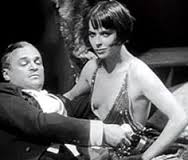 Pabst chose a little known American actress over the more experienced Marlene Dietrich for the part of Lulu, a decision that made the young Louise Brooks an international star. Her innocent looks paired with her natural erotic allure and sense of movement – Brooks was also a dancer – perfectly matched Pabst’s idea of his heroine as unwitting seductress. Subjected to cuts to eliminate some of its “scandalous” content and unfavourably reviewed by critics at the time, it is now considered one of the boldest and most modern films of the Weimar era highlighting Pabst’s command of camera language and montage. Find out more at silentlondon.co.uk . June 4, 8 and 14 screenings with live musical accompaniment. Other screenings with recorded soundtrack. BFI Southbank. London Link
Pabst chose a little known American actress over the more experienced Marlene Dietrich for the part of Lulu, a decision that made the young Louise Brooks an international star. Her innocent looks paired with her natural erotic allure and sense of movement – Brooks was also a dancer – perfectly matched Pabst’s idea of his heroine as unwitting seductress. Subjected to cuts to eliminate some of its “scandalous” content and unfavourably reviewed by critics at the time, it is now considered one of the boldest and most modern films of the Weimar era highlighting Pabst’s command of camera language and montage. Find out more at silentlondon.co.uk . June 4, 8 and 14 screenings with live musical accompaniment. Other screenings with recorded soundtrack. BFI Southbank. London Link
2 June
 Siren of the Tropics (Dir. Mario Nalpas/Henri Etievant, Fr, 1927) (Screening format – Video, 86mins) A Parisian count sends engineer André Berval (Batcheff) to the fictional colony of Monte Puebla in order to pursue his beloved. Once there, Berval becomes the object of affection for Papitou (Baker), who follows him from Monte Puebla to Paris, where she discovers her true calling as a performer. Originally released on the back of her European tour, the film further underlined Baker’s talents as an electrifying, world-class entertainer. Find out more at epubs.surrey.ac.uk. With recorded Donald Sosin soundtrack. BFI Southbank, London Link
Siren of the Tropics (Dir. Mario Nalpas/Henri Etievant, Fr, 1927) (Screening format – Video, 86mins) A Parisian count sends engineer André Berval (Batcheff) to the fictional colony of Monte Puebla in order to pursue his beloved. Once there, Berval becomes the object of affection for Papitou (Baker), who follows him from Monte Puebla to Paris, where she discovers her true calling as a performer. Originally released on the back of her European tour, the film further underlined Baker’s talents as an electrifying, world-class entertainer. Find out more at epubs.surrey.ac.uk. With recorded Donald Sosin soundtrack. BFI Southbank, London Link
3 June
 Mothers of Men (aka Every Women’s Problem) (Dir. Willis Robards, US, 1917) + The Last Appeal (Dir. Fred Paul, UK, 1921) (Screening format – DCP, 65/13mins) Willis Robards’ Mothers of Men was re-released in 1921 after the passage of the 19th Amendment, as Every Woman’s Problem. It questions whether women were capable
Mothers of Men (aka Every Women’s Problem) (Dir. Willis Robards, US, 1917) + The Last Appeal (Dir. Fred Paul, UK, 1921) (Screening format – DCP, 65/13mins) Willis Robards’ Mothers of Men was re-released in 1921 after the passage of the 19th Amendment, as Every Woman’s Problem. It questions whether women were capable  of taking the tough decisions required of high office – in this case a judge elected as state Governor faced with the dilemma of refusing a pardon to her husband who is facing a death sentence. Find out more at wfpp.cdrs.columbia.edu. The Last Appeal, is an episode from the Grand Guignol series in which a judge, adamant he was right to pass the death sentence for a crime of passion, makes a terrible discovery. With live piano accompaniment from John Sweeney. BFI Southbank, London Link
of taking the tough decisions required of high office – in this case a judge elected as state Governor faced with the dilemma of refusing a pardon to her husband who is facing a death sentence. Find out more at wfpp.cdrs.columbia.edu. The Last Appeal, is an episode from the Grand Guignol series in which a judge, adamant he was right to pass the death sentence for a crime of passion, makes a terrible discovery. With live piano accompaniment from John Sweeney. BFI Southbank, London Link
 The Adventures of Prince Achmed (Dir. Lotte Reiniger , Ger, 1926) (Screening format – DCP, 65mins) The first feature-length animation in film history, masterminded by Lotte Reiniger and hand-tinted frame by frame. Based on ‘The Arabian Nights’, the film tells the epic tale of Prince Achmed, who is tricked into mounting a magical flying horse by a wicked sorcerer. The horse carries Achmed off on a series of adventures, over the course of which he joins forces with young Aladdin, battles ogres and monsters and romances the beautiful Princess Peri Banu.Find out more at wikipedia.org . With recorded score. BFI Southbank, London Link
The Adventures of Prince Achmed (Dir. Lotte Reiniger , Ger, 1926) (Screening format – DCP, 65mins) The first feature-length animation in film history, masterminded by Lotte Reiniger and hand-tinted frame by frame. Based on ‘The Arabian Nights’, the film tells the epic tale of Prince Achmed, who is tricked into mounting a magical flying horse by a wicked sorcerer. The horse carries Achmed off on a series of adventures, over the course of which he joins forces with young Aladdin, battles ogres and monsters and romances the beautiful Princess Peri Banu.Find out more at wikipedia.org . With recorded score. BFI Southbank, London Link
 The Ancient Law (aka Das Alte Gesetz) (Dir. E A Dupont, Ger, 1923) (Screening format – DCP, 135 mins) In the mid 1800s in Galicia, Baruch Mayer (Ernst Deutsch), yearns to become an actor. Despite
The Ancient Law (aka Das Alte Gesetz) (Dir. E A Dupont, Ger, 1923) (Screening format – DCP, 135 mins) In the mid 1800s in Galicia, Baruch Mayer (Ernst Deutsch), yearns to become an actor. Despite  the expectation to follow in his father’s footsteps and become an orthodox rabbi, he breaks from tradition and leaves the shtetl in pursuit of his dream. Whilst performing in a traveling theatre troupe he meets the Austrian archduchess, Elisabeth Theresia (Henny Porten), who falls in love with the young man. With her support he joins the renowned Vienna’s Burg Theatre company where he soon rises to fame. “With its complex portrayal
the expectation to follow in his father’s footsteps and become an orthodox rabbi, he breaks from tradition and leaves the shtetl in pursuit of his dream. Whilst performing in a traveling theatre troupe he meets the Austrian archduchess, Elisabeth Theresia (Henny Porten), who falls in love with the young man. With her support he joins the renowned Vienna’s Burg Theatre company where he soon rises to fame. “With its complex portrayal  of orthodoxy and emancipation, E. A. Dupont’s period film marks a highpoint of Jewish filmmaking in Germany. This new restoration marks the first time that a version corresponding to the lost 1920s German theatrical release will be shown, both in its original length, and with the colourisation digitally restored.” – Berlinale 68. Find out more at silentfilm.org. With live musical accompaniment by Meg Morley. Phoenix Cinema, East Finchley Link NB Screening time of this film has been slightly amended so as to avoid clashing with Mothers of Men (1917) at BFI Southbank
of orthodoxy and emancipation, E. A. Dupont’s period film marks a highpoint of Jewish filmmaking in Germany. This new restoration marks the first time that a version corresponding to the lost 1920s German theatrical release will be shown, both in its original length, and with the colourisation digitally restored.” – Berlinale 68. Find out more at silentfilm.org. With live musical accompaniment by Meg Morley. Phoenix Cinema, East Finchley Link NB Screening time of this film has been slightly amended so as to avoid clashing with Mothers of Men (1917) at BFI Southbank
4 June
 Piccadilly (Dir E A Dupont, UK, 1929) (Screening format – DCP, 92 mins) A film noir before the term was in use, uncredited German director E.A. Dupont’s Piccadilly is one of the true greats of British silent films, on a par with the best of Anthony Asquith or Alfred Hitchcock during this period. Valentine Wilmot (Jameson Thomas) owns a nightclub featuring dancers Mabel (Gilda Gray) and
Piccadilly (Dir E A Dupont, UK, 1929) (Screening format – DCP, 92 mins) A film noir before the term was in use, uncredited German director E.A. Dupont’s Piccadilly is one of the true greats of British silent films, on a par with the best of Anthony Asquith or Alfred Hitchcock during this period. Valentine Wilmot (Jameson Thomas) owns a nightclub featuring dancers Mabel (Gilda Gray) and  Vic (Cyril Ritchard). After a confrontation with Wilmot, Vic quits performing at the club. When the joint starts losing business, a desperate Wilmot hires former dishwasher Shosho (Anna May Wong) as a dancer. She is an instant hit and forms a rapport with Wilmot, which makes both Mabel and Shosho’s friend (King Ho Chang) jealous, leading to a mysterious murder. A stylish evocation of Jazz Age London, with dazzlingly fluid cinematography and scenes ranging from the opulent West End to the seediness of Limehouse. One of the pinnacles of British silent cinema, Piccadilly is a sumptuous show business melodrama seething with sexual and racial tension – with an original screenplay by Arnold Bennett. Find out more at screenonline.org.uk . With recorded soundtrack. BFI Southbank, London Link
Vic (Cyril Ritchard). After a confrontation with Wilmot, Vic quits performing at the club. When the joint starts losing business, a desperate Wilmot hires former dishwasher Shosho (Anna May Wong) as a dancer. She is an instant hit and forms a rapport with Wilmot, which makes both Mabel and Shosho’s friend (King Ho Chang) jealous, leading to a mysterious murder. A stylish evocation of Jazz Age London, with dazzlingly fluid cinematography and scenes ranging from the opulent West End to the seediness of Limehouse. One of the pinnacles of British silent cinema, Piccadilly is a sumptuous show business melodrama seething with sexual and racial tension – with an original screenplay by Arnold Bennett. Find out more at screenonline.org.uk . With recorded soundtrack. BFI Southbank, London Link
5 – 7 June (3 screenings)
Pandora’s Box (Dir. G W Pabst, Ger, 1929) (Screening format – DCP, 135mins) For film details see 1-14 June above. With recorded soundtrack. Picturehouse Central, London Link
6 June
 Siren of the Tropics (Dir. Mario Nalpas/Henri Etievant, Fr, 1927) (Screening format – Video, 86mins) A Parisian count sends engineer André Berval (Batcheff) to the fictional colony of Monte Puebla in order to pursue his beloved. Once there, Berval becomes the object of affection for Papitou (Baker), who follows him from Monte Puebla to Paris, where she discovers her true calling as a performer. Originally released on the back of her European tour, the film further underlined Baker’s talents as an electrifying, world-class entertainer. Find out more at epubs.surrey.ac.uk. With recorded Donald Sosin soundtrack. Introduced by film programmer Tega Okiti BFI Southbank, London Link
Siren of the Tropics (Dir. Mario Nalpas/Henri Etievant, Fr, 1927) (Screening format – Video, 86mins) A Parisian count sends engineer André Berval (Batcheff) to the fictional colony of Monte Puebla in order to pursue his beloved. Once there, Berval becomes the object of affection for Papitou (Baker), who follows him from Monte Puebla to Paris, where she discovers her true calling as a performer. Originally released on the back of her European tour, the film further underlined Baker’s talents as an electrifying, world-class entertainer. Find out more at epubs.surrey.ac.uk. With recorded Donald Sosin soundtrack. Introduced by film programmer Tega Okiti BFI Southbank, London Link
7 June
Pandora’s Box (Dir. G W Pabst, Ger, 1929) (Screening format – DCP, 135mins) For film details see 1-14 June above. With recorded soundtrack. Barbican, London Link
9 June
 Lotte Reiniger Afternoon at Birkbeck Institute for the Moving Image (BIMI) with a special focus on the German filmmaker Lotte Reiniger. Reiniger was one of the 20th century’s major animation artists, pioneering a unique and distinctive style of black and white silhouette animation in her interpretations of classic myths and fairy tales. In this edition of the Children’s FIlm Club we will be showing a small selection of her films. With recorded soundtrack. BIMI, London WC1 Link
Lotte Reiniger Afternoon at Birkbeck Institute for the Moving Image (BIMI) with a special focus on the German filmmaker Lotte Reiniger. Reiniger was one of the 20th century’s major animation artists, pioneering a unique and distinctive style of black and white silhouette animation in her interpretations of classic myths and fairy tales. In this edition of the Children’s FIlm Club we will be showing a small selection of her films. With recorded soundtrack. BIMI, London WC1 Link
13 June
 It (Dir. Clarance Badger, US, 1927 (Screening format – 35mm, 72mins) Betty Lou (Bow) is a working-class shopgirl with a crush on the owner (Moreno) of the department store where she works. Through a series of hilarious hijinks, Betty Lou attracts her crush’s attention, until a case of mistaken identity creates a rift between them. Believed lost for many years, this charming silent rom-com solidified Clara Bow as cinema’s first ‘it girl.’ Find out more at moviessilently.com. With recorded Carl Davis score. Introduced by Aga Baranowska, Events Programmer. BFI Southbank, London Link
It (Dir. Clarance Badger, US, 1927 (Screening format – 35mm, 72mins) Betty Lou (Bow) is a working-class shopgirl with a crush on the owner (Moreno) of the department store where she works. Through a series of hilarious hijinks, Betty Lou attracts her crush’s attention, until a case of mistaken identity creates a rift between them. Believed lost for many years, this charming silent rom-com solidified Clara Bow as cinema’s first ‘it girl.’ Find out more at moviessilently.com. With recorded Carl Davis score. Introduced by Aga Baranowska, Events Programmer. BFI Southbank, London Link
 The Road To Happiness (Dir. Michael Curtiz, Aust, 1926) (Screening format – 35mm, 78mins) The Road to Happiness (aka Fiaker Nr.13) was directed in Austria by Michael Curtiz (to give the later anglicised version of his name) and produced by Arnold Pressburger. It was adapted from Xavier de Montépin’s novel by Alfred Schirokauer. The Road to Happiness stars Lili Damita and Jack Trevor in the story of a newborn baby girl whose mother leaves her in a carriage. The coachman raises the girl, who grows up to become a dancer and finds both romance and her real father. Find out more at filmaffinity.com. A Kennington Bioscope presentation. With live musical accompaniment. The Cinema Museum, Lambeth Link
The Road To Happiness (Dir. Michael Curtiz, Aust, 1926) (Screening format – 35mm, 78mins) The Road to Happiness (aka Fiaker Nr.13) was directed in Austria by Michael Curtiz (to give the later anglicised version of his name) and produced by Arnold Pressburger. It was adapted from Xavier de Montépin’s novel by Alfred Schirokauer. The Road to Happiness stars Lili Damita and Jack Trevor in the story of a newborn baby girl whose mother leaves her in a carriage. The coachman raises the girl, who grows up to become a dancer and finds both romance and her real father. Find out more at filmaffinity.com. A Kennington Bioscope presentation. With live musical accompaniment. The Cinema Museum, Lambeth Link
17 June
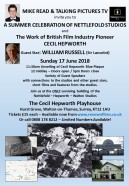 Nettlefold Studio’s Event 2018 – A summer celebration of Nettlefold Studios and The Work of British Film Industry Pioneer Cecil Hepworth. Guest Star: William Russell (TV’s The Adventures of Sir Lancelot, 1956, Dr Who, 1963-5) plus a variety of other guest speakers with connections to the studios and other guest stars, short films and features from the studios. Presented by Renown Pictures/Talking Pictures TV. The Cecil Hepworth Playhouse, Walton-on-Thames, Surrey Link
Nettlefold Studio’s Event 2018 – A summer celebration of Nettlefold Studios and The Work of British Film Industry Pioneer Cecil Hepworth. Guest Star: William Russell (TV’s The Adventures of Sir Lancelot, 1956, Dr Who, 1963-5) plus a variety of other guest speakers with connections to the studios and other guest stars, short films and features from the studios. Presented by Renown Pictures/Talking Pictures TV. The Cecil Hepworth Playhouse, Walton-on-Thames, Surrey Link
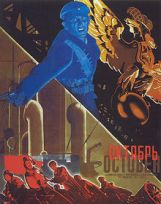 October: Ten Days That Shook The World (Dir. Sergei Eisenstein, USSR, 1928) (Screening format – 35mm, 104mins) Eisenstein’s classic epic commissioned in 1927 to celebrate the 10th anniversary of the Russian Revolution, uses montage and a documentary style to present the events of the Bolshevik uprising in 1917. The resulting footage has often been mistaken for genuine newsreel, although some 1917 footage (shot by Esther Shub) was incorporated. In documentary style, events in Petrograd are re-enacted from the end of the monarchy in February of 1917 to the end of the provisional government and the decrees of peace and of land in November of that year. Lenin returns in April. In July, counter-revolutionaries put down a spontaneous revolt, and Lenin’s arrest is ordered. By late October, the Bolsheviks are ready to strike: ten days will shake the world. Fnd out more at wikipedia.org With live musical accompaniment by electro-improvisational group Grok. Genesis Cinema, London Link
October: Ten Days That Shook The World (Dir. Sergei Eisenstein, USSR, 1928) (Screening format – 35mm, 104mins) Eisenstein’s classic epic commissioned in 1927 to celebrate the 10th anniversary of the Russian Revolution, uses montage and a documentary style to present the events of the Bolshevik uprising in 1917. The resulting footage has often been mistaken for genuine newsreel, although some 1917 footage (shot by Esther Shub) was incorporated. In documentary style, events in Petrograd are re-enacted from the end of the monarchy in February of 1917 to the end of the provisional government and the decrees of peace and of land in November of that year. Lenin returns in April. In July, counter-revolutionaries put down a spontaneous revolt, and Lenin’s arrest is ordered. By late October, the Bolsheviks are ready to strike: ten days will shake the world. Fnd out more at wikipedia.org With live musical accompaniment by electro-improvisational group Grok. Genesis Cinema, London Link
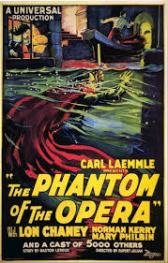 Phantom Of The Opera (Dir. Rupert Julian, 1925) (Screening format – not known, 103mins) A title that needs no introduction, The Phantom of the Opera has spawned many remakes, remasters and sequels. This original film version, produced with moments of early Technicolour, sees Lon Chaney, the ‘Man of a Thousand Faces’ perform one of his most iconic roles. His ghastly make-up and outrageous performance made this title a benchmark in the American silent film era. The film was a critical and commercial success upon release, and still stands as an important film in cinematic history to this day, with press quotes from the time labeling the film an ‘ultra-fantastic melodrama’ (New York Times), ‘produced on a stupendous scale’ (Moving Picture World) and ‘probably the
Phantom Of The Opera (Dir. Rupert Julian, 1925) (Screening format – not known, 103mins) A title that needs no introduction, The Phantom of the Opera has spawned many remakes, remasters and sequels. This original film version, produced with moments of early Technicolour, sees Lon Chaney, the ‘Man of a Thousand Faces’ perform one of his most iconic roles. His ghastly make-up and outrageous performance made this title a benchmark in the American silent film era. The film was a critical and commercial success upon release, and still stands as an important film in cinematic history to this day, with press quotes from the time labeling the film an ‘ultra-fantastic melodrama’ (New York Times), ‘produced on a stupendous scale’ (Moving Picture World) and ‘probably the  greatest inducement to nightmare that has yet been screened’ (Variety). The mysterious phantom (Lon Chaney) is a vengeful composer living in the catacombs under the Paris Opera House, determined to promote the career of the singer he loves (Mary Philbin). Famed for the phantom’s shock unmasking, incredible set designs and the masked ball sequence, it still packs a punch. Find out more at wikipedia.org. With live musical accompaniment from musicians of the Guildhall School’s Electronic Music Studio. Barbican, London Link
greatest inducement to nightmare that has yet been screened’ (Variety). The mysterious phantom (Lon Chaney) is a vengeful composer living in the catacombs under the Paris Opera House, determined to promote the career of the singer he loves (Mary Philbin). Famed for the phantom’s shock unmasking, incredible set designs and the masked ball sequence, it still packs a punch. Find out more at wikipedia.org. With live musical accompaniment from musicians of the Guildhall School’s Electronic Music Studio. Barbican, London Link
18 June
 It (Dir. Clarance Badger, US, 1927 (Screening format – 35mm, 72mins) Betty Lou (Bow) is a working-class shopgirl with a crush on the owner (Moreno) of the department store where she works. Through a series of hilarious hijinks, Betty Lou attracts her crush’s attention, until a case of mistaken identity creates a rift between them. Believed lost for many years, this charming silent rom-com solidified Clara Bow as cinema’s first ‘it girl.’ Find out more at moviessilently.com. With live piano accompaniment. BFI Southbank, London Link
It (Dir. Clarance Badger, US, 1927 (Screening format – 35mm, 72mins) Betty Lou (Bow) is a working-class shopgirl with a crush on the owner (Moreno) of the department store where she works. Through a series of hilarious hijinks, Betty Lou attracts her crush’s attention, until a case of mistaken identity creates a rift between them. Believed lost for many years, this charming silent rom-com solidified Clara Bow as cinema’s first ‘it girl.’ Find out more at moviessilently.com. With live piano accompaniment. BFI Southbank, London Link
19 June
 The Adventures of Prince Achmed (Dir. Lotte Reiniger , Ger, 1926) (Screening format – DCP, 65mins) The first feature-length animation in film history, masterminded by Lotte Reiniger and hand-tinted frame by frame. Based on ‘The Arabian Nights’, the film tells the epic tale of Prince Achmed, who is tricked into mounting a magical flying horse by a wicked sorcerer. The horse carries Achmed off on a series of adventures, over the course of which he joins forces with young Aladdin, battles ogres and monsters and romances the beautiful Princess Peri Banu.Find out more at wikipedia.org . With recorded score. Introduced by Jez Stewart, Curator (Animation) BFI National Archive. BFI Southbank, London Link
The Adventures of Prince Achmed (Dir. Lotte Reiniger , Ger, 1926) (Screening format – DCP, 65mins) The first feature-length animation in film history, masterminded by Lotte Reiniger and hand-tinted frame by frame. Based on ‘The Arabian Nights’, the film tells the epic tale of Prince Achmed, who is tricked into mounting a magical flying horse by a wicked sorcerer. The horse carries Achmed off on a series of adventures, over the course of which he joins forces with young Aladdin, battles ogres and monsters and romances the beautiful Princess Peri Banu.Find out more at wikipedia.org . With recorded score. Introduced by Jez Stewart, Curator (Animation) BFI National Archive. BFI Southbank, London Link
21 – 30 June (19 Screenings)
 Arcadia (Dir. Paul Wright, UK, 2017) (Screening format – DCP, 78mins) From over 100 years’ worth of astonishing film footage from the BFI National Archive, BAFTA®-winner Paul Wright (For Those in Peril) has crafted a dense poetic essay on Britain’s shifting relationship to the land, drawing on inspiration from The Wicker Man to
Arcadia (Dir. Paul Wright, UK, 2017) (Screening format – DCP, 78mins) From over 100 years’ worth of astonishing film footage from the BFI National Archive, BAFTA®-winner Paul Wright (For Those in Peril) has crafted a dense poetic essay on Britain’s shifting relationship to the land, drawing on inspiration from The Wicker Man to 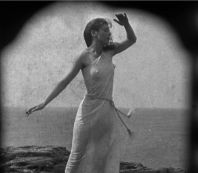 Winstanley. An unnamed female figure from the future travels through the ‘seasons’: from a fleeting pastoral idyll through dark and earthy Pagan folk rituals to industrialisation, political turmoil, extremism and division, and cataclysmic storms and as such, it’s impossible not to read premonitions of Brexit into Wright’s captivating vision. Find out more at imdb.com With recorded soundtrack composed by Adrian Utley (Portishead) and Will Gregory (Goldfrapp). BFI Southbank, London Link
Winstanley. An unnamed female figure from the future travels through the ‘seasons’: from a fleeting pastoral idyll through dark and earthy Pagan folk rituals to industrialisation, political turmoil, extremism and division, and cataclysmic storms and as such, it’s impossible not to read premonitions of Brexit into Wright’s captivating vision. Find out more at imdb.com With recorded soundtrack composed by Adrian Utley (Portishead) and Will Gregory (Goldfrapp). BFI Southbank, London Link
23 June
Pandora’s Box (Dir. G W Pabst, Ger, 1929) (Screening format – DCP, 135mins) For film details see 1-14 June above. With recorded soundtrack. Soho House, Dean Street, London Link
24 June
Pandora’s Box (Dir. G W Pabst, Ger, 1929) (Screening format – DCP, 135mins) For film details see 1-14 June above. With live musical accompaniment. Palace Cinema, Broadstairs, Kent Link
28 June
 Piccadilly (Dir E A Dupont, UK, 1929) (Screening format – DCP, 92 mins) A film noir before the term was in use, uncredited German director E.A. Dupont’s Piccadilly is one of the true greats of British silent films, on a par with the best of Anthony Asquith or Alfred Hitchcock during this period. Valentine Wilmot (Jameson Thomas) owns a nightclub featuring dancers Mabel (Gilda Gray) and
Piccadilly (Dir E A Dupont, UK, 1929) (Screening format – DCP, 92 mins) A film noir before the term was in use, uncredited German director E.A. Dupont’s Piccadilly is one of the true greats of British silent films, on a par with the best of Anthony Asquith or Alfred Hitchcock during this period. Valentine Wilmot (Jameson Thomas) owns a nightclub featuring dancers Mabel (Gilda Gray) and  Vic (Cyril Ritchard). After a confrontation with Wilmot, Vic quits performing at the club. When the joint starts losing business, a desperate Wilmot hires former dishwasher Shosho (Anna May Wong) as a dancer. She is an instant hit and forms a rapport with Wilmot, which makes both Mabel and Shosho’s friend (King Ho Chang) jealous, leading to a mysterious murder. A stylish evocation of Jazz Age London, with dazzlingly fluid cinematography and scenes ranging from the opulent West End to the seediness of Limehouse. One of the pinnacles of British silent cinema, Piccadilly is a sumptuous show business melodrama seething with sexual and racial tension – with an original screenplay by Arnold Bennett. Find out more at screenonline.org.uk . With recorded soundtrack. BFI Southbank, London Link
Vic (Cyril Ritchard). After a confrontation with Wilmot, Vic quits performing at the club. When the joint starts losing business, a desperate Wilmot hires former dishwasher Shosho (Anna May Wong) as a dancer. She is an instant hit and forms a rapport with Wilmot, which makes both Mabel and Shosho’s friend (King Ho Chang) jealous, leading to a mysterious murder. A stylish evocation of Jazz Age London, with dazzlingly fluid cinematography and scenes ranging from the opulent West End to the seediness of Limehouse. One of the pinnacles of British silent cinema, Piccadilly is a sumptuous show business melodrama seething with sexual and racial tension – with an original screenplay by Arnold Bennett. Find out more at screenonline.org.uk . With recorded soundtrack. BFI Southbank, London Link
NB. Whilst every effort has been taken to ensure that the information contained in these listings is accurate, silentfilmcalendar.org can take no responsibility for any errors or inaccuracies. You are strongly advised to confirm with the venue that the event remains as detailed, particularly if traveling any distance to attend.
